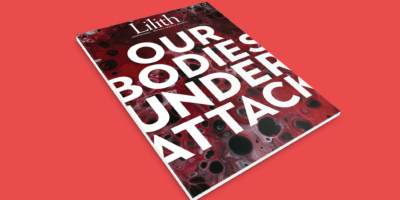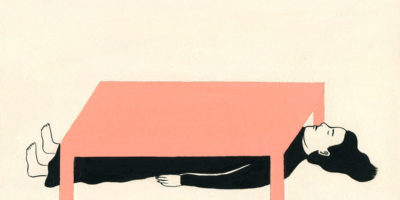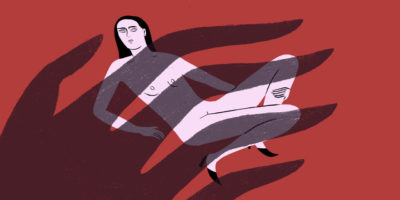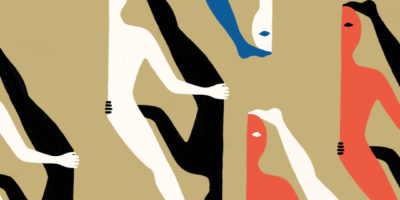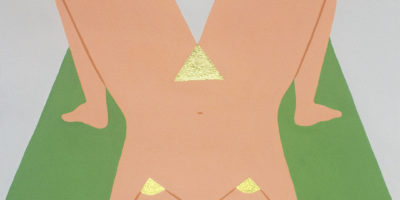
The Female Side of God Speaks to Joy Ladin
Joy Ladin’s theology has long been one of tremendous courage; she wrests from cis-gender readers not only an empathic understanding of what it is like to have a hidden, sometimes even suicidal, trans-identity (certainly not an identity of “choice”), but also an understanding of a God who has a matching identity. The Shekhinah-God, a female form of God, is inside every one of us, Ladin argues, and She feels just as Ladin has felt: estranged, muzzled, violated because of her “invisible breasts” and the patriarchy’s cold-blooded silencing. The Shekhinah-God says to Ladin, “When you suffer, I suffer./ Comfort me/by being comforted.”
Her new collection Shekhinah Speaks [selva oscura press, $18.00] startles the reader from the get-go. Each poem opens with two epigraphs, the first from the prophet Isaiah, and the second from Cosmopolitan magazine. What? It’s a brilliant pairing: readers must stretch to connect the empathic syntax of two strange bedfellows, and by stretching feel the wages of Ladin’s own life.
Ladin is perhaps our most gifted and tortured contemporary poet. A transgender woman with a Ph.D. from Princeton University and a hard-won, litigated tenure (because of transmisogyny) at Yeshiva University’s Stern College for Women, Ladin has argued that poetry is the only medium vast enough to contain the “unstable, contradictory” and self-disfiguring multitudes that define a life like hers.
The poem “Melting Away” opens with Isaiah’s words: “You say to yourself, ‘I am, and there is no one besides me’” paired with Cosmo’s “The Scary, Scary Way Your Friends Are Losing Weight [February 12, 2019].” Isaiah’s “Awake, awake … clothe yourself with strength!” is paired with “What Really Happens When You’re in a Coma [February 5, 2019].” There is also “I Had an Abortion in Alabama, and My Neighbors Shamed Me” and “What It Was Like Painting a Nearly Naked Ariana Grande for Her ‘God Is A Woman’ Music Video.”
In the poem “I Do” — framed with the epigraphs “Unhappy, storm-tossed, uncomforted one!” from Isaiah and “12 Achingly Beautiful Bridal Trends You’ll Want to Steal for Your Wedding” — Ladin has the Shekhinah say this: “Unhappy, storm-tossed, uncomforted one/ you ache for me/ even though I’m here … It’s your attention that comes and goes,/ half inside, half outside … calling you/ to realize, to remember,/ that wherever you are, I am.” This poem, the last in the book, ends with a marriage proposal from the Shekhinah: “I’m yours –/ I’ve always been –/ the moment you say I do.”
Trans identity, like Jewish identity, perhaps, is more mainstream than in the past, but each remains unsafe, with histories that are a form of traumatic memory. The “too Jewish” question syncs to a degree with a “too trans” one — the project of identity-making sometimes defiantly elusive. How do we know ourselves? From the inside out? Or from the outside in? If the latter, how do we even live if there’s a disjunctive chasm that eradicates our capacity to assemble who we are? Kafka, when asked what he had in common with Jews, said that he wondered what he had in common with himself.
Ladin “textifies” these questions and brings to her ultimative “I Do” poem her once-silenced, but now deeply active and present, fiancée, whose name is Shekhinah. We can all be married to this Shekhinah-God, Ladin shows us. To know ourselves we must find our reflection in that Other. Making the silent (in Jewish tradition) Shekhinah speak is an act that is deeply feminist, queer, and transgender.
Ladin definitively writes herself into a central role in Shechinah Speaks, but her readers come to understand that this only happens because she writes the Shekhinah into a central role, too. The Shekhinah-God, just like Ladin herself, needs to be fully (and finally) seen. Ladin understands that poetry is a covenant, an artform that refuses to internalize the humiliations and rejections, the amnesia, of the outside world. Shekhinah Speaks “covenants” the marriage between God and selfhood.
The Jewish God Yahweh (Jehovah) gets His name translated as “I am that I am,” but Ladin’s immanent God — our female God — takes this further; for Her, “I am that You are.”
“On the other side/ of whatever you are,/ there’s nothing but I am,/ a whisper that stumbles/ out of the kitchen/ and crawls across your skin: time; a bowl;/ a drink of water; a nightmare/ trying to wake you up/ by singing in your ear.”
Ladin’s Shekhinah-God kicks the shit out of the dick-waving Yahweh-God, reminding me of the Jewish ethnographic photographer Tyagan Miller whose portraits were always accompanied by his subjects’ own words. “It’s bad enough that I took the pictures,” he said. Ladin’s Shekhinah observes these fieldwork ethics, recognizing that everything that’s holy, everything that “counts,” is a two-way process of both giving and receiving. Yahweh demands that we think about the photographer who took the picture. Not so the Shekhinah: She’s in the picture. Inside of us. Never on the outside taking photos.
“I sit in the stubble of your heart,/ listening to you say I am.”
“On the best days, you feel me/ sitting amidst the brokenness of your body.”
“I still surround you/ like a uterus, and you/ are still my baby.”
—Susan Schnur, by her own definition a bad poet, a so-so rabbi, and a somewhat better clinical psychologist, can be reached at susanschnur@gmail.com.

